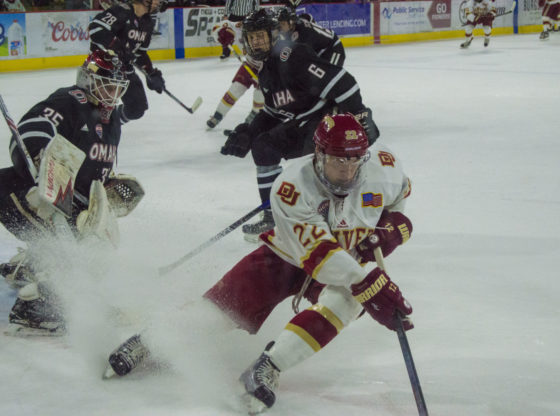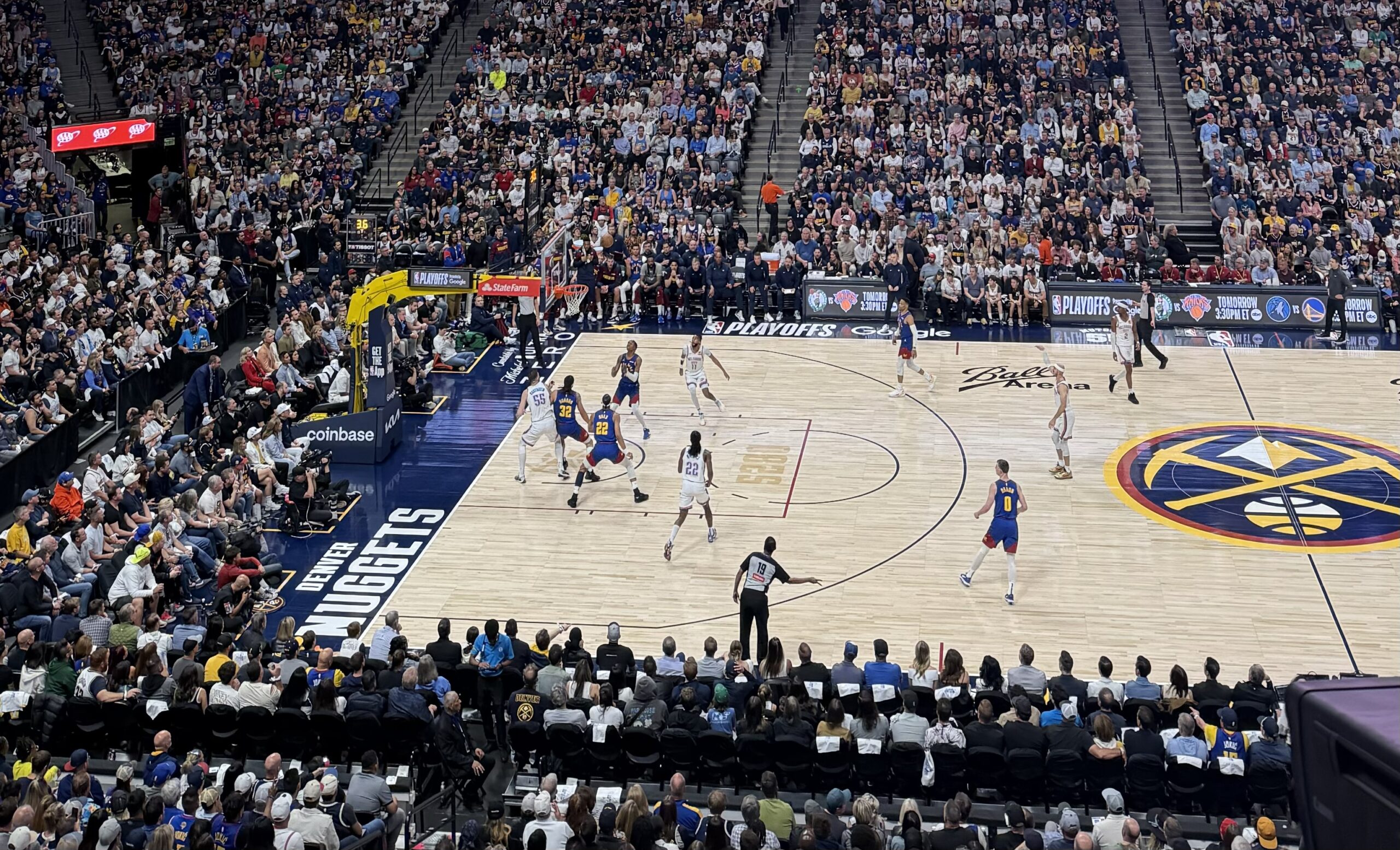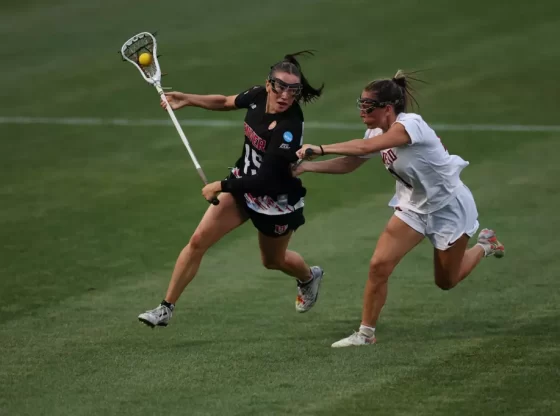As the 2011-2012 athletic season nears its end, the Pioneer athletic department is preparing for a major transition that has been seven years in the making, as 10 of its 17 athletic programs will leave the Sun Belt Conference to join the Western Athletic Conference (WAC) for the 2012-2013 season.
The following year, the Pioneer hockey program will join the start-up National Collegiate Hockey Conference (NCHC) after 53 years in the Western Collegiate Hockey Association (WCHA), where the team caputured seven national championships.
While Denver did not become a Division I program across the board until 1998, the athletic department has developed rapidly since then and is now home to 320 student athletes spread across five conferences. In the fall of 2011, DU received its record fourth consecutive Learfield Sports I-AAA Directors’ Cup, earning recognition as the top Division I athletic program without a football team.
The Sun Belt housed the majority of Pioneer athletic programs since 1999-2000, but the university will sever its ties with the conference as men’s and women’s basketball, women’s soccer, men’s and women’s golf, men’s and women’s tennis, volleyball and women’s swimming and diving will all make the transition to the WAC this fall. Gymnastics joined the WAC for the 2011-2012 season, claiming the conference championship on March 24.
“The Sun Belt was a great home for us,” said Peg Bradley-Doppes, Vice Chancellor for Athletics and Recreation. “They took us in as we turned Division I. I am very thankful for our SBC membership, but our geographic location made it a real challenge. The financial travel costs were demanding and the missed class time was severe.”
The SBC is home to teams located in Florida, Tennessee and Kentucky, among others, forcing Denver to travel great distances for conference competitions. According to Bradley-Doppes, the geographic dispersal of Sun Belt teams also led to a lack of name recognition in Denver, decreasing interest in the competitions.
“It’s tough to get people to come to games sometimes,” said Bradley-Doppes. “We are playing good universities, but they’re not from around here. The great thing is that the WAC makes more sense. The Sun Belt was wonderful to take us, but people would say the SBC basketball game of week is Florida International and Denver – two good places, but it was a stretch to make the connection. With the WAC, it’s easy for people to understand: We’re in the West and therefore here is our competition.”
As teams across the nation transition to new conferences, the WAC is a moving picture, according to Bradley-Doppes, but as of right now Denver will join the University of Texas at San Antonio, Texas State, the University of Texas at Arlington and Seattle University as new members of the WAC this fall. Returning members will include San Jose State University, Utah State, Idaho and Boise State.
“The WAC, just like every other conference, is going through turbulent times, losing and gaining members,” said Bradley-Doppes. “But the WAC provides us continuity, consistency and a safe harbor for the Pioneers to call home.”
In addition to reducing travel time and expenditures, membership in the WAC will also drastically lessen the amount of class time student athletes miss for athletic events.
“With the new conference affiliation, [the athletes] won’t have to spend so much time in so many different time zones and so many different airports,” said Bradley-Doppes. “They’ll be able to be on campus, engaged in their studies and engaged in campus life.”
With the WAC headquartered less than 10 miles from DU in Greenwood Village, Bradley-Doppes predicts a close relationship forming between the WAC and the Denver athletic department. The university has already offered to host as many championships as possible in the upcoming season, and Chancellor Robert Coombe will host the WAC presidents and chancellors for their meetings this summer.
While the bulk of Pioneer athletics will move into the WAC, several programs will remain in their current conferences. As of now, men’s soccer and women’s lacrosse are in the Mountain Pacific Sports Federation, men’s lacrosse is in the Eastern Collegiate Athletic Conference and men’s and women’s skiing are in the Rocky Mountain Intercollegiate Ski Association. Men’s swimming and diving has left the Sun Belt but has not yet committed to a new conference, according to Bradley-Doppes.
B
Hockey prepares for final season in WCHA
B
The Pioneer hockey program will remain a member of the WCHA for the 2012-2013 season before joining the NCHC in the fall of 2013 in the conference’s first season. Denver will join Colorado College, Miami University, University of Minnesota-Duluth, University of Nebraska-Omaha, University of North Dakota, St. Cloud State University and Western Michigan University, boasting four NCAA Champions and 14 NCAA Frozen Four appearances since 2000 amongst the programs.
“The formation of the NCHC was for hockey programs that had a vision and a commitment to national success,” said Bradley-Doppes. “It is a tremendous hockey conference, a tough one, but it’s wonderful for our coaches, recruits and certainly fans. We have a fierce rivalry with Colorado College and North Dakota, and they’re in the NCHC with us. But I also expect new rivalries to develop.”
Similar to the other athletic programs, Bradley-Doppes said the geographic range of the WCHA members led to a lack of name recognition with the opponents, who are as far away as Alaska. As such, many of this year’s hockey games revealed a lackluster student section.
“The kids do a great job with the campout, and they certainly turn out in droves for specific games,” said Bradley-Doppes. “It’s the hottest ticket in town. But it’s difficult with hockey because of the Friday and Saturday back-to-back.”
However, looking forward, Bradley-Doppes is confident the new conference affiliation will foster passionate rivalries amongst students, athletes and general fans alike, boosting attendance at home games. She predicts the Feb. 5 men’s basketball game against Middle Tennessee, which was televised on ESPN2 and drew an outpouring of Pioneer pride, will become the norm in coming years, especially as more Pioneer athletic events garner national television coverage.
“It makes a huge difference for our athletes and alums [when students attend],” said Bradley-Doppes. “We can have a full house except for the student section, and it’s not the same. To say that students make a positive difference would be an understatement. They’re the sixth man in basketball, the additional guy on the ice in hockey. It’s amazing what our students can do.”
B
“Lacrosse Capital of the West”
B
On the other end of the spectrum, the Pioneer lacrosse programs have been attracting large crowds this season, with the men’s team boasting multiple sold-out games. In a sport restricted primarily to the East Coast, Denver has given rise to two highly competitive programs in the past few years.
Despite being one of only two Division I lacrosse programs west of the Mississippi, the Pioneer men’s team made a magical Final Four run last season, opening the rest of the country’s eyes to the fast-paced sport. Denver’s women’s team recorded a 12-game winning streak and posted a 6-1 record in the MPSF, a conference that houses all eight women’s programs west of the Mississippi, the rest of which are located in either California or Oregon.
With the University of Colorado adding a Division I women’s lacrosse program in the spring of 2014 and lacrosse becoming the fastest growing sport in the NCAA, Denver appears to be leading the way in the expansion of the sport across the country. In fact, Inside Lacrosse magazine named Denver the nation’s No. 1 lacrosse city in 2009.
“I will be very surprised if lacrosse doesn’t expand significantly, not only here in Colorado but in California as well,” said Bradley-Doppes. “People are amazed with what DU has done. We believe that Peter Barton is the best lacrosse stadium in the country, and we’ve trademarked the University of Denver as the ‘Lacrosse Capital of the West.'”
Bradley-Doppes attributes the success of the lacrosse programs not only to the athletes, but to the coaching staff as well. Men’s head coach Bill Tierney is in his third season with the Pioneers after serving as the head coach at Princeton for more than 20 years, and women’s head coach Liza Kelly is in her sixth season at Denver after five years as head coach at Boston University. During that time, Kelly has led the Pioneers to a 31-4 conference record, including three conference sweeps.
“They’re a great staff,” said Bradley-Doppes. “They have grown the program at every level – not just the collegiate game, but the youth programs, summer camps, community outreach and student engagement. They’re also bringing in national powers. I want us to be an institution that strives to be the best we can be and compete against the best. We’re known by the company we keep, and we continue to schedule with that in mind. We are not backing down, and we’ll play anybody any time.”
As the Pioneers prepare for their busy future, Bradley-Doppes is optimistic about all the athletic department will accomplish. Rather than being known for one or two specific athletic programs, she said she prides herself in the fact that DU has 17 outstanding programs, all with tremendous futures ahead.
With a project seven years in the making now coming to a close in the WAC transition, it would be easy for the university to pat itself on the back and relax for a season or two, but Bradley-Doppes is nowhere near done pursuing the bettering of the Pioneer community.
“You can never be complacent,” said Bradley-Doppes. “We can’t control the outside world of intercollegiate athletics, but we what we can do is focus on what’s so great about our program. If we can just focus on us, on our student athletes graduating, on running a program that makes everyone proud and makes our students want to come to events and get engaged in intramural and club programs, then I think everything else will take care of itself. We’ll be able to continue attracting the best and brightest minds and coaches to come here.”









